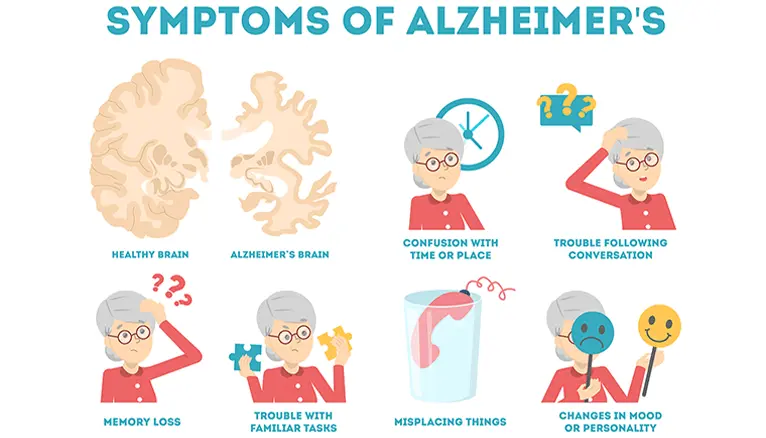Alzheimer’s disease is a progressive neurological disorder that affects memory, thinking, and behavior. In the United States, it is the most common form of dementia, impacting millions of older adults and their families. As life expectancy increases, awareness and understanding of Alzheimer’s become more critical for early detection and prevention.

What Is Alzheimer’s Disease?
Alzheimer’s disease slowly destroys brain cells, leading to memory loss and cognitive decline. While some memory issues are a normal part of aging, Alzheimer’s symptoms go beyond forgetfulness. Individuals may struggle to complete familiar tasks, repeat questions, lose track of time or place, and show mood or personality changes. These symptoms typically worsen over time, eventually interfering with daily life and independence.
Who Is at Risk?
Although age is the greatest risk factor, Alzheimer’s is not a normal part of aging. Genetics, family history, and lifestyle also play significant roles. People over 65 are at higher risk, especially those with a family member who has had the disease. Additionally, conditions such as heart disease, high blood pressure, diabetes, and obesity can increase the chances of developing Alzheimer’s. Lifestyle choices—like smoking, lack of exercise, and poor diet—may also contribute to cognitive decline.
Recognizing the Early Signs
Early detection is crucial for planning care and exploring treatment options. Common early signs include short-term memory loss, confusion with time or place, difficulty finding words, and trouble with decision-making. Some may also withdraw from social activities or show reduced interest in things they once enjoyed. If these symptoms appear, it’s important to consult a healthcare professional to determine whether they are related to Alzheimer’s or another condition.
How to Help Prevent Alzheimer’s
While there is no guaranteed way to prevent Alzheimer’s, certain lifestyle choices may help reduce the risk. Regular physical activity, a brain-healthy diet (like the Mediterranean or DASH diet), and mental stimulation—such as puzzles, reading, or learning new skills—can support brain health. Maintaining strong social connections and managing chronic health conditions also play an important role. Quitting smoking and limiting alcohol intake are additional steps that can promote overall brain function.
Current Treatments and Research
There is no cure for Alzheimer’s disease, but some medications can help manage symptoms or slow progression in the early stages. Cholinesterase inhibitors and memantine are commonly prescribed to help with memory and cognition. Ongoing research is exploring new drugs, lifestyle interventions, and early detection methods. Clinical trials are open across the U.S. for those interested in contributing to Alzheimer’s research and potentially accessing new treatments.
Caring for Someone with Alzheimer’s
Providing care for a loved one with Alzheimer’s can be emotionally and physically demanding. Caregivers may help with everything from medication and daily routines to managing mood swings and ensuring safety. Building a support system, accessing respite care, and seeking guidance from local Alzheimer’s associations can ease the burden. Resources such as adult day programs, support groups, and memory care facilities are available in many communities across the country.
When to Seek Help
If you or a loved one begins showing signs of memory loss or cognitive decline, don’t wait to seek medical advice. A doctor may conduct tests and imaging to rule out other causes and offer guidance for the next steps. Early intervention can improve quality of life, provide access to support, and allow for better planning.
Conclusion: Knowledge Is Key
Alzheimer’s disease affects not only those diagnosed but also their families and caregivers. By staying informed about symptoms, risk factors, prevention strategies, and support options, individuals can take proactive steps to protect brain health and respond effectively when signs appear. Whether you’re concerned about a loved one or planning for your future, understanding Alzheimer’s is the first step toward a safer, more prepared tomorrow.
